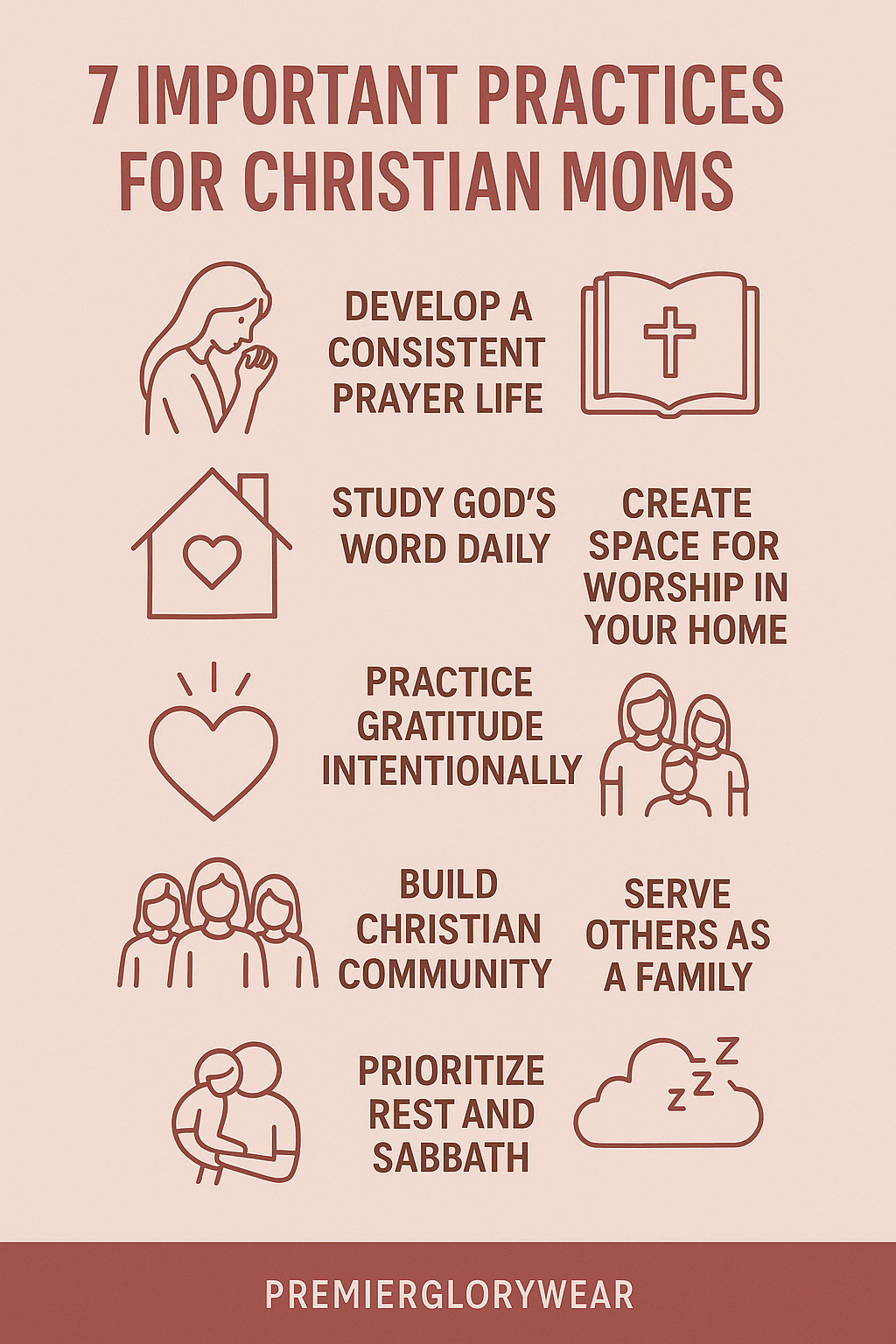7 Important Practices For Christian Moms

What does it look like to raise children who love God in today's world? This question keeps many Christian mothers awake at night, wondering if they're doing enough to build strong faith foundations in their families.
The answer isn't found in perfect parenting or flawless spiritual disciplines. Instead, it lies in simple practices that weave faith naturally into your family's daily life. These aren't complicated strategies that require hours of preparation or seminary training. They're practical, biblical approaches that any mother can embrace, regardless of her stage in motherhood or depth of spiritual knowledge.
Let's check them out
1. Develop a Consistent Prayer Life

Prayer changes everything about how you handle motherhood. When you talk to God regularly, your perspective shifts from "I must handle everything alone" to "God walks with me through this."
Start small with just five minutes each morning. While your coffee brews, thank God for one thing from yesterday and ask for help with today's challenges. This simple habit creates a foundation that supports you through difficult moments.
The beauty of prayer lies in its flexibility. You can pray while folding laundry, driving carpool, or washing dishes. God wants to be part of your everyday moments, not just your formal quiet times.
If you struggle to know what to pray, consider using prayer cards or guides. Our previous post on "The Art of Prayer" offers practical ways to deepen your prayer life even when time feels scarce. Prayer tools can provide structure when your mind feels scattered or your heart feels heavy.
2. Study God's Word Daily
Reading Scripture feeds your soul with truth that counters the lies the world tells about motherhood. When you feel like you're failing, God's Word reminds you of His love and grace. When you feel overwhelmed, it offers peace and perspective.
Bible study doesn't require hours of time or seminary-level understanding. Start with just ten minutes reading one chapter or even a few verses. Focus on understanding how God's character applies to your current struggles and joys.
Choose a consistent time that works with your schedule. Some moms prefer early morning before children wake up. Others find naptime or evening works better. The key is consistency, not perfection.
Consider using a devotional designed specifically for mothers. These resources connect Scripture to the daily realities of parenting, making God's Word more practical and applicable to your life.
Keep a notebook nearby while you read. Write down verses that speak to you, questions that arise, or ways you want to apply what you've learned. This practice helps you remember and internalize what you've read.
3. Create Space for Worship in Your Home
Your home becomes a place where your family encounters God together. This doesn't mean turning your living room into a church sanctuary, but rather incorporating worship into your daily rhythms. Play Christian music while you cook dinner or clean the house. Sing worship songs in the car. These simple acts create an atmosphere where God's presence feels natural and welcome.
Establish family devotion times that fit your children's ages and attention spans. For young children, this might be five minutes of Bible stories and simple prayers. Older children can participate in longer discussions about faith and how it applies to their lives.
According to the National Study of Youth and Religion, families who engage in regular faith practices together report stronger relationships and better communication. Children from these homes also show greater resilience during difficult times.
Celebrate God's goodness together. When good things happen, thank God as a family. When challenges arise, pray together and remind each other of God's faithfulness. These moments teach your children that God is involved in every aspect of life.
4. Practice Gratitude Intentionally
Gratitude transforms your perspective from what's lacking to what God has provided. This practice becomes especially important during challenging seasons when complaints come more easily than thanksgiving.
Start a family gratitude practice where everyone shares one thing they're thankful for each day. This could happen during dinner, bedtime, or car rides. The specific time matters less than the consistency.
Keep a gratitude journal where you write down three things you're thankful for each day. Include both big blessings and small moments of grace. This practice trains your mind to notice God's goodness even during difficult days.
Teach your children to express gratitude beyond just saying "thank you." Help them recognize God as the source of all good gifts. When they receive something special, guide them to thank God first, then the person who gave it to them.
Model gratitude in how you talk about your circumstances. Instead of constantly complaining about challenges, look for ways to express thankfulness even in difficult situations. Your children learn more from what they observe than what they're told.
5. Build Christian Community

Motherhood was never meant to be a solo journey. God designed us for community, and Christian fellowship provides encouragement, accountability, and support that you cannot find elsewhere.
Find a church where your family can grow spiritually and build relationships with other believers. Look for congregations that offer programs for children and opportunities for you to connect with other mothers who share your values.
Join a small group or Bible study with other women. These intimate settings provide space to share struggles, pray for each other, and study God's Word together. The friendships formed in these groups often become lifelines during difficult seasons.
Don't wait for others to reach out to you. Take initiative in building relationships. Invite another family over for dinner. Like the use, you can organize playdates with other Christian moms. Offer to help when someone faces challenges.
6. Serve Others as a Family
Service teaches your children that faith involves action, not just belief. When your family serves together, you demonstrate that following Jesus means caring for others' needs.
You can start with simple acts of service your children can understand and participate in. Bake cookies for new neighbors. Help elderly church members with yard work. Participate in food drives or clothing donations.
Look for regular service opportunities where your family can commit long-term. In fact, use everyday moments to teach service. Help your children notice when others have needs and brainstorm ways to help. This might mean sharing toys with friends, helping siblings with chores, or writing encouragement notes to family members.
Talk about why you serve. Explain that serving others reflects God's love and demonstrates gratitude for what He has given your family. Help your children understand that service is both a privilege and a responsibility.
7. Prioritize Rest and Sabbath
Rest is not selfish - it's biblical. God modeled rest after creation and commanded His people to observe Sabbath. As a Christian mom, you need regular rest to maintain physical, emotional, and spiritual health.
Establish a weekly Sabbath rhythm for your family. This doesn't have to be rigid or legalistic, but it should include rest from regular work and intentional focus on God. Plan activities that refresh your family's spirits rather than drain them.
Create daily rhythms that include rest. This might mean quiet time in the afternoon, earlier bedtimes, or peaceful morning routines. Small moments of rest throughout your day prevent burnout and maintain perspective.
Learn to say no to activities that drain your family's energy without adding value. Your calendar should reflect your priorities, not everyone else's expectations. Protecting your family's rest requires intentional choices about how you spend time.
Model healthy rest for your children. Show them that taking breaks is wise, not lazy. Demonstrate that rest includes both physical relaxation and spiritual renewal. Your example teaches them to value rest throughout their lives.
If you struggle with making time for rest and reflection, consider starting a prayer journal. Our guide on "How to Create a Prayer Journal" offers practical steps for establishing this restful spiritual discipline that many mothers find refreshing and centering.
Making These Practices Sustainable
These seven practices work best when implemented gradually rather than all at once. Choose one or two to focus on first, then add others as these become natural parts of your routine. Remember that seasons of motherhood vary, and your practices may need to adjust accordingly. What works with a newborn differs from what works with teenagers. Give yourself grace to modify these practices as your family's needs change.
Don't aim for perfection in any of these areas. The goal is growth, not flawless execution. Also, you can find accountability partners who can encourage you in these practices. Share your goals with trusted friends who will check in on your progress and pray for your success. Community makes every spiritual discipline more achievable and enjoyable.
Conclusion
These practices shape not only your own spiritual growth but also your children's understanding of what it means to follow Jesus. Children who grow up in homes where these practices are normal develop stronger faith foundations and better life skills.
Your investment in spiritual practices today creates a legacy that extends far beyond your own life. The prayers you pray, the Scripture you study, and the service you provide teaches your children how to live as Christians in a complex world.
Don't underestimate the power of consistent, small steps. These seven practices may seem simple, but their cumulative effect over time creates profound transformation in your heart, your home, and your family's future.
Frequently Asked Questions
What if I miss several days of practicing these disciplines?
Give yourself grace and simply start again. Consistency matters more than perfection. God's love for you doesn't depend on your performance in spiritual practices. These disciplines serve you, not the other way around.
How do I teach these practices to children of different ages?
Adapt each practice to your children's developmental levels. Toddlers can sing simple worship songs and say short prayers. School-age children can participate in family devotions and service projects. Teenagers can engage in deeper Bible study and take leadership roles in family worship.
What if my spouse doesn't support these spiritual practices?
Focus on what you can control in your own spiritual life and with your children. Pray for your spouse and model these practices consistently.
What if I don't feel like these practices are making a difference?
Spiritual growth often happens gradually and isn't always immediately visible. Trust that God is working even when you don't feel dramatic changes. Continue practicing these disciplines faithfully, knowing that their benefits accumulate over time.





